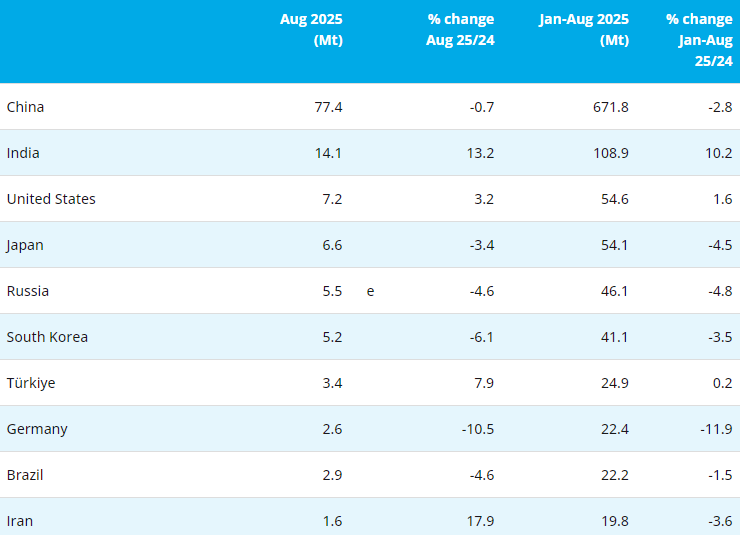The vanadium rally slowed in Europe and the USA last week, as market participants awaited signs of longevity in recently elevated prices, and in particular, news on extensions to production cuts in China’s Sichuan province into September.
- Market participants await news of new or extended environmental closures in vanadium-producing provinces.
- Resurfacing of old ferro-vanadium stocks in China temporarily eases domestic tightness, but higher prices on the cards if production cuts persist.
- Chinese buyers eye arbitrage opportunities with Europe in case of protracted production cuts at home.
Spot export prices were unchanged for Chinese ferro-vanadium last week as old stocks resurfaced and smaller market players took profit.
Chinese ferro-vanadium prices were steady at $55-60 per kg, fob, last week, while V2O5 prices held at $12-13 per lb, fob China, according to Metal Bulletin’s assessment.
Around 500-600 tonnes of ferro-vanadium has rematerialised, and may have been bought as much as eight years ago, local sources said.
"The old stocks have come out: a sign of very tight supplies. If the production cuts enforced by environmental inspections in Sichuan province last for two months or longer, and these stocks are used up, vanadium prices will rise further," a local market source said.
"There has also been some profit-taking from small guys to turn some quick cash," a producer source said.
China’s domestic prices for ferro-vanadium were indicated at $60-65 per kg, but many exporters are still declining to offer to the export market since prices in Europe are still significantly lower.
Metal Bulletin assessed European ferro-vanadium prices at $41-43 per kg, delivered duty-paid, on August 11, up from $40.40-42.60 per kg midweek.
Sellers in the region have continued to increase their offers to European buyers, keeping higher replacement costs for Chinese material in mind, but offers at $44-45 per kg have not been accepted so far.
Prices consolidate in Europe
European V2O5 prices consolidated at $9-10 per lb, in-warehouse Rotterdam, on August 11, from $8.50-10.30 per lb previously.
Market participants are waiting to see if producers in China’s Sichuan province, where environmental inspections have been focused in recent weeks, are given permission to resume production in September.
There are also concerns that after visiting Sichuan, inspectors will move on to Hubei, which would signal continued tightness in the vanadium market.
The premium commanded by Chinese sellers compared with European prices continues to offer an arbitrage opportunity to Chinese buyers seeking to relieve tightness in the domestic market.
However, lack of clarity over extended or additional inspections in China has limited the amount of shipments from Europe, amid concerns prices could turn during the time it takes to ship material back to China.
"The Chinese have opened dialogue with us but at the moment they would buy from Korea," a trader in Europe said.
US market grinds to a halt
In the USA, ferro-vanadium prices narrowed to $18.50-19.50 per lb, in-warehouse Pittsburgh, last week, according to sister title AMM’s latest assessment, compared with $18-20 per lb previously.
After a three-week run which saw prices rise 58%, prices levelled off as the US spot market ground to a halt, with buyers opting to hold off purchasing, awaiting for more clarity in the market.
"Very, very quiet this week in North America," a source told AMM. "Hopefully some spot activity next week will help US prices catch up with Europe."
While the market waits on the sidelines for a signs of staying power for the recently elevated prices, market participants are keeping a watchful eye on the overseas markets, particularly in China.
"The longevity of the price run is entirely dependent on what happens in China," a second supplier source said. "If the environmental audits continue and steel production starts ramping up, then we will see prices continue to run."
Higher costs from China look set to support prices elsewhere in the immediate term, however.
"China is the 'real deal’ for a while yet at least," a third supplier source said.
- [Editor:Wang Linyan]



 Save
Save Print
Print Daily News
Daily News Research
Research Magazine
Magazine Company Database
Company Database Customized Database
Customized Database Conferences
Conferences Advertisement
Advertisement Trade
Trade
















Tell Us What You Think